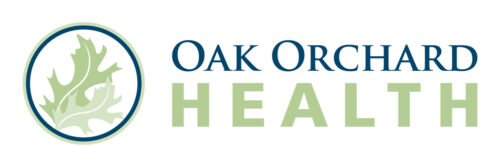Your eye exam: What happens and why it matters

By Dr. Robert Ford, OD
Chief of Optometry, Oak Orchard Health
Vision health is a complex topic and is different but related to the physical health of the eyes. I am an Optometrist with a Doctorate in Optometry, and I call myself a vision specialist.

An eye exam usually takes between 30 to 45 minutes. If you need glasses, that will take extra time and is handled by opticians, not the doctor. The optometrist, or vision specialist, is the person who checks your vision, gives you a prescription if needed, and looks for any eye health issues. They do not make or sell glasses, but they work with opticians who help with that part. At Oak Orchard Health, we have opticians in our Vision Center.
What exactly does a vision specialist do?
I start by asking my patients if they have any vision complaints. Do they have glasses or contacts? When did they get them? Can they see in the distance and close up with their glasses or without glasses or contacts? Do they get headaches or double vision? Do their eyes tear, feel dry, itch, or get red? Do they have any complaints at all about their eyes or their vision?
We then analyze how well they see with and without glasses or contacts. I determine their visual acuity at different distances by having them read letters or look at pictures of different sizes. We look at their eye movements and alignment (do their eyes cross or wander).
How much stress do you put on your eyes?
One of the most important things we need to know is the patient’s visual demands. Do they spend a lot of time reading, using a computer, or doing other tasks that require good vision? What is their occupation, or are they students? Understanding how you use your eyes every day helps the doctor determine what kind of prescription, if any, you might need.
Next, we evaluate the patient’s visual skills. We analyze the patient’s focusing ability, eye muscle balance, and eye movement skills. Can the patient see clearly at the required distances?
Getting the correct prescription
Once the optometrist knows the patient’s visual demands and whether the patient has the visual skills to meet those demands, the doctor determines what lenses, if any, are needed to enable the patient to perform on the job, at school, or play. Your doctor will write a prescription for lenses that match your vision requirements. The patient is then sent to a licensed optician who looks at the doctor’s prescription and helps the patient get the appropriate hardware, frame, and lenses designed for the patient’s visual demands.
More complex eye conditions
All vision specialists examine the patient’s eye health. They screen for cataracts, glaucoma, eye muscle problems, dry eyes, eyelid problems, retinal health, diabetic eye problems, and more. They must measure eye pressure and dilate the pupils to see the inside of the eyes. If necessary, they refer to Ophthalmologists for severe medical eye problems or eye surgery.
How often are eye exams needed
for adults and children?
Pediatricians evaluate newborns and young children before starting school and refer them to optometrists and ophthalmologists if they suspect a problem. Most people should have an eye exam every two to four years, but some need them more often. People with diabetes and early-stage cataracts should do exams every year. Younger children, especially those getting their first pair of glasses, may need to return more often (every six months) to make sure their prescription is working well.
Taking care of your eyes is important because good vision affects daily life, work, and school performance. People with clear vision can be more productive and feel more comfortable doing tasks that require focus. A healthy lifestyle can also help keep your eyes in good shape.
If you need an eye exam, contact Oak Orchard Health’s Vision Center at 585-637-3905.




